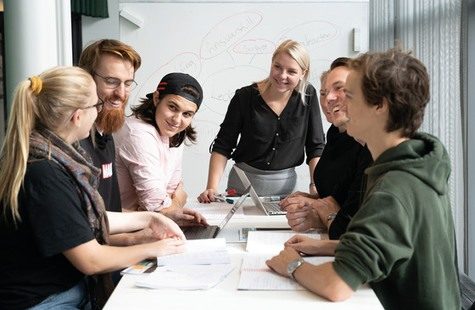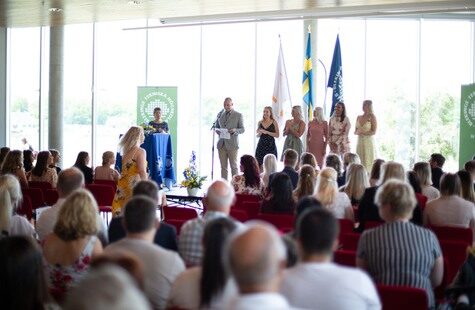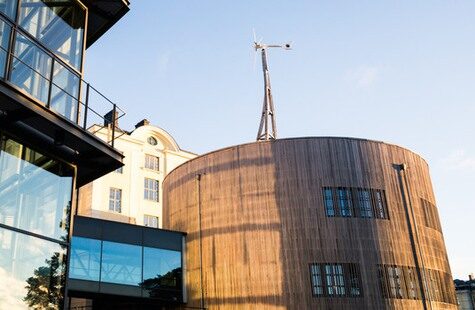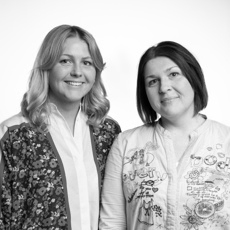Master’s Programme in Computer Science
120 credits
- Period : 2024-September-02 until 2026-June-07
- Location: Campus Karlskrona
- Type of instruction: On campus, day-time, full-time
- Application code: BTH-90588
- Language of instruction: English
- Programme syllabus: Download
It is no longer possible to apply to this occasion
A Master’s degree that covers a broad scope of fields in computer science – with a customed front-edge competence of your own choice.
Computer science includes subjects such as programming, data structures, distributed systems, network technologies, algorithms, and complexity, and the programme has three main directions – IT security, intelligent systems, and distributed and parallel systems. The programme gives you both width in the field of computer science as well as the opportunity to profile your knowledge through elective courses.
Mandatory courses deal with subjects such as machine learning and artificial intelligence, computer system security and software security, but also in multiprocessor systems and performance optimisation.
Focus on research and future security
The programme places great emphasis on research preparation, and the courses focus on aspects close to the research front within computer science and different ways of applying these. The teaching consists of lectures, seminars and laboratories in groups or individually and at the end of the programme, you will conduct a degree project.
The programme consists of 120 credits and leads to a two-year Master’s degree.
The tuition fee is SEK 60,000 per semester. One semester corresponds to 30 ECTS credits. EU/EEA citizens are not required to pay fees.

Programme content
Elective courses
AI, machine learning and data science
The Master’s programme in Computer Science is a broad programme that allows you to profile yourself within a specific area and deepen your knowledge through elective courses within the field of computer science, choosing from three main directions: IT security, Intelligent Systems, and Distributed and Parallel Systems. The programme requires significant knowledge of programming.
During the first year, you will learn how to apply methods and skills that prepare you for future elective courses within your chosen direction. This includes courses in artificial intelligence, modelling and decision support – but there are also courses in cloud computing, IT security, statistics, research methodology and multiprocessor systems. Many of the courses are already optional in the first year. Mandatory courses in the first semester are artificial intelligence, Unix programming, cloud computing and network security. In these courses, the practical assignments are based on programming, i.e. you will be required to program your own solutions.
During the second year, you have the opportunity to study courses that are linked to different areas of application and current research projects. Here, you are encouraged to work on current challenges in areas such as pattern recognition, machine learning, image processing, simulation and game development. Other examples of areas of application are various techniques for decision support systems in, among other things, the police’s crime prevention and crime investigation work, as well as resource planning in the energy sector, healthcare and the transport sector.
In the last semester, you conduct your degree project based on the methods and skills you have learned and the profile you chose via optional courses. Ambitious students are offered the opportunity to carry out their degree projects within ongoing research projects in collaboration with businesses.
Subjects covered by the three main directions:
- The focus of the IT security specialisation includes courses in safe software development, software security and analysis of malicious software.
- In the field of parallel and distributed systems, we work a lot with performance issues, parallel programming, virtualisation and cloud-based systems.
- Within the field of intelligent systems, you will learn techniques for how to develop computer-based functionals that are capable of complex processing and data analysis. This field includes courses in machine learning, simulation and decision support.
Note! The course list is tentative. See the programme syllabus for an established course list.
Courses autumn semester 2024
Machine Learning, 7,5 hp
Introduction to Cloud Computing, 7,5 hp
Programming in UNIX Environment, 7,5 hp
Applied Artificial Intelligence, 7,5 hp
Courses spring semester 2025
Secure Software Engineering, 7,5 hp *
Advanced Networking, 7,5 hp *
Usability and Interaction Design, 7,5 hp *
Advanced Machine Learning, 7,5 hp *
Deep Machine Learning, 7,5 hp *
Decision Support Systems, 7,5 hp *
Mathematical Statistics, 7,5 hp *
Network and Service Operations, 7,5 hp *
Software Metrics, 7,5 hp *
Research Methodology in Computer Science, 7,5 hp
* Valbar kurs
Courses autumn semester 2025
Multiprocessor Programming, 7,5 hp *
Software Security, 7,5 hp *
Applied Cloud Computing and Big Data, 7,5 hp *
Performance Optimization, 7,5 hp *
Capacity Analysis, 7,5 hp *
Malware Analysis, 7,5 hp *
Sustainable development of information and communication technology, 7,5 hp *
Advanced Topic in Computing, 7,5 hp
* Valbar kurs
Courses spring semester 2026
Students who apply for a course or programme, and meet the general and specific entry requirements, compete with one another for available places. When there are more qualified applicants than there are places for an education, the places are distributed through a selection. The selection is made according to selection method 1. Read about the selection procedure here.
The study programmes at BTH are continuously monitored and developed through yearly follow-up dialogues, course evaluations after each completed course, and programme evaluations. Results from follow-ups and evaluations can lead to changes in the programmes. These changes are always communicated to the students.
Each educational programme is tied to an advisory board that discusses issues such as the quality of the programme, its development, and relevance for the labour market. In the advisory board, or a committee to the advisory board, teachers, external members, students and alumni are represented.
Research

The research in computer science and engineering covers a broad area and BTH focuses on two areas: big data and AI as well as parallel computer systems.
Learn more about our research in computer science and engineering.
Good to know
Look below for information about how to apply, entry requirements and important dates.







